Impact of Penalty Rate Reduction on Employees in Australia
VerifiedAdded on 2023/03/21
|13
|3027
|62
AI Summary
This report discusses the decision of Fair Work Commission to reduce penalty rates for workers in Australia and its impact on employees. It examines the arguments for and against the decision, evidence of the effect on wages and employment, and the political debates surrounding the issue. The report concludes by suggesting that the decision should be reversed due to its negative impact on employees.
Contribute Materials
Your contribution can guide someone’s learning journey. Share your
documents today.
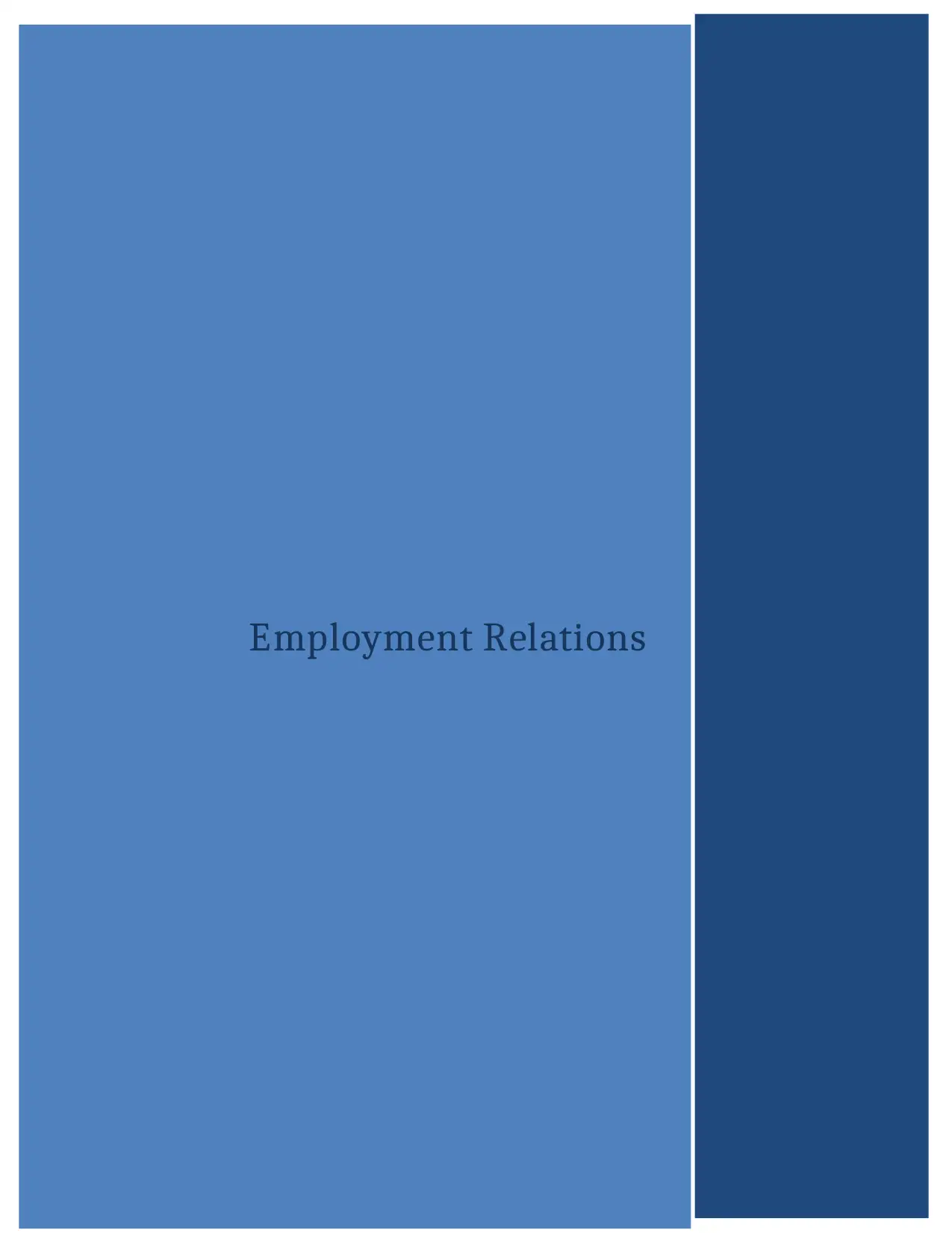
Running Head: BUSINESS AND CORPORATION LAW 0
Employment Relations
Employment Relations
Secure Best Marks with AI Grader
Need help grading? Try our AI Grader for instant feedback on your assignments.
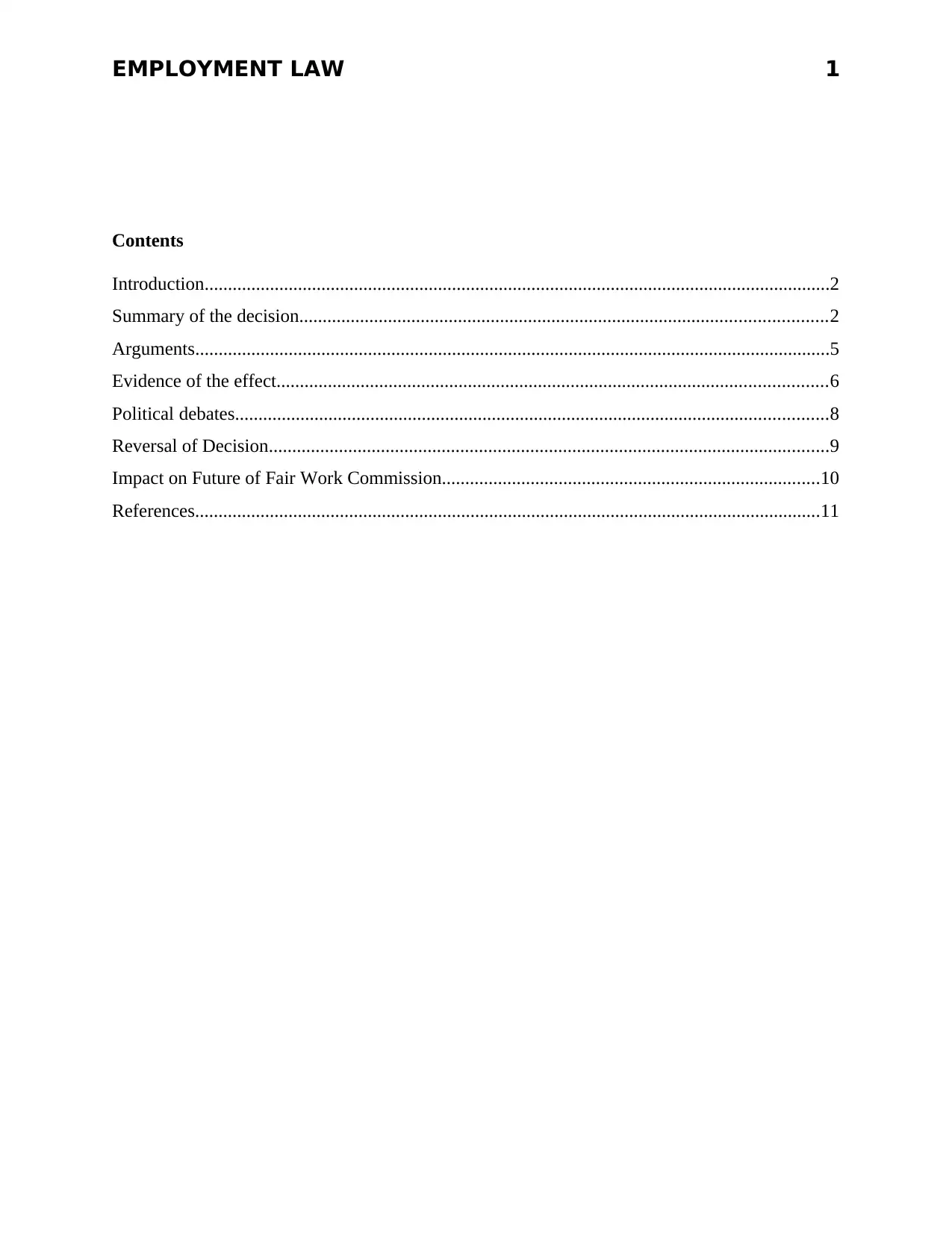
EMPLOYMENT LAW 1
Contents
Introduction......................................................................................................................................2
Summary of the decision.................................................................................................................2
Arguments........................................................................................................................................5
Evidence of the effect......................................................................................................................6
Political debates...............................................................................................................................8
Reversal of Decision........................................................................................................................9
Impact on Future of Fair Work Commission.................................................................................10
References......................................................................................................................................11
Contents
Introduction......................................................................................................................................2
Summary of the decision.................................................................................................................2
Arguments........................................................................................................................................5
Evidence of the effect......................................................................................................................6
Political debates...............................................................................................................................8
Reversal of Decision........................................................................................................................9
Impact on Future of Fair Work Commission.................................................................................10
References......................................................................................................................................11
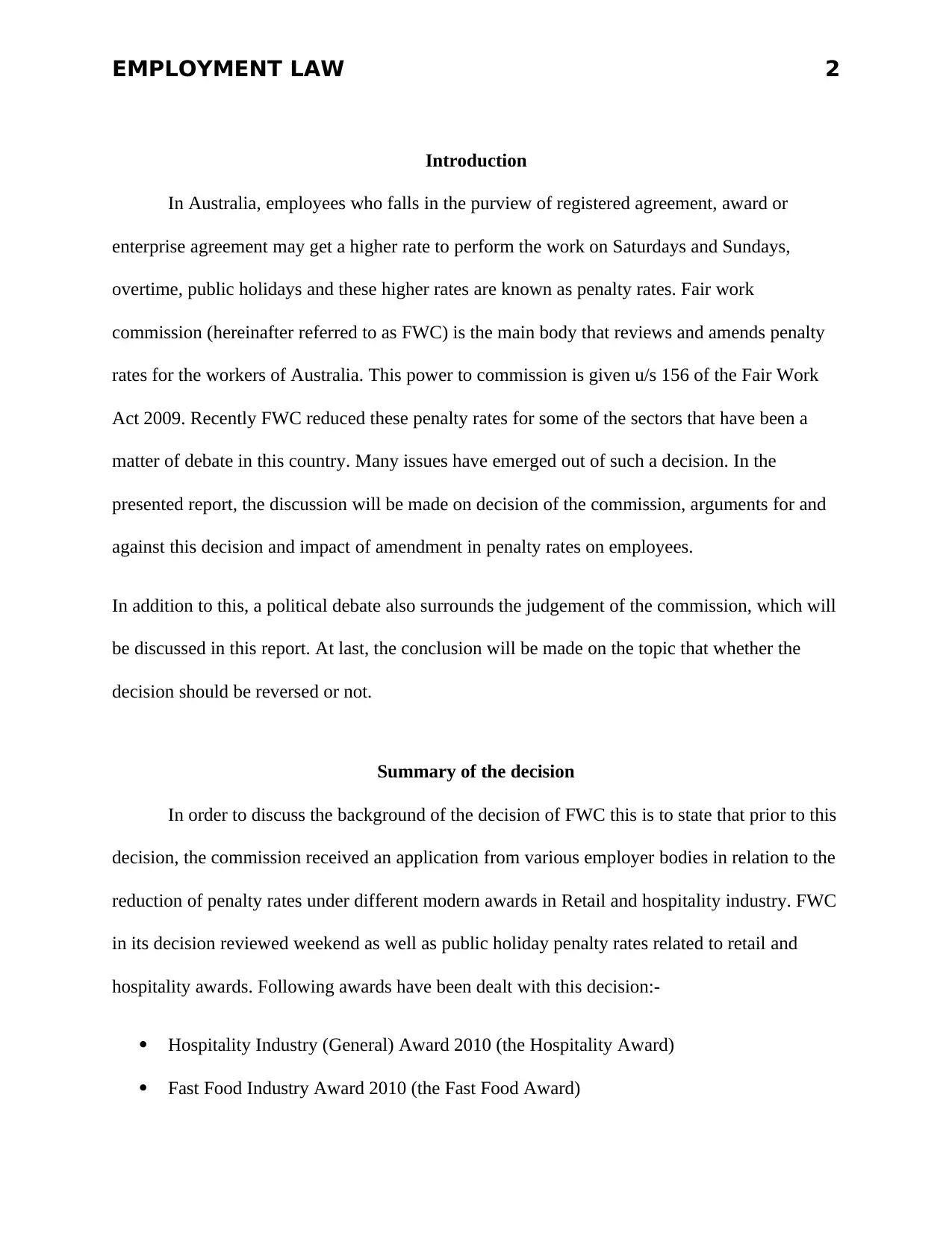
EMPLOYMENT LAW 2
Introduction
In Australia, employees who falls in the purview of registered agreement, award or
enterprise agreement may get a higher rate to perform the work on Saturdays and Sundays,
overtime, public holidays and these higher rates are known as penalty rates. Fair work
commission (hereinafter referred to as FWC) is the main body that reviews and amends penalty
rates for the workers of Australia. This power to commission is given u/s 156 of the Fair Work
Act 2009. Recently FWC reduced these penalty rates for some of the sectors that have been a
matter of debate in this country. Many issues have emerged out of such a decision. In the
presented report, the discussion will be made on decision of the commission, arguments for and
against this decision and impact of amendment in penalty rates on employees.
In addition to this, a political debate also surrounds the judgement of the commission, which will
be discussed in this report. At last, the conclusion will be made on the topic that whether the
decision should be reversed or not.
Summary of the decision
In order to discuss the background of the decision of FWC this is to state that prior to this
decision, the commission received an application from various employer bodies in relation to the
reduction of penalty rates under different modern awards in Retail and hospitality industry. FWC
in its decision reviewed weekend as well as public holiday penalty rates related to retail and
hospitality awards. Following awards have been dealt with this decision:-
Hospitality Industry (General) Award 2010 (the Hospitality Award)
Fast Food Industry Award 2010 (the Fast Food Award)
Introduction
In Australia, employees who falls in the purview of registered agreement, award or
enterprise agreement may get a higher rate to perform the work on Saturdays and Sundays,
overtime, public holidays and these higher rates are known as penalty rates. Fair work
commission (hereinafter referred to as FWC) is the main body that reviews and amends penalty
rates for the workers of Australia. This power to commission is given u/s 156 of the Fair Work
Act 2009. Recently FWC reduced these penalty rates for some of the sectors that have been a
matter of debate in this country. Many issues have emerged out of such a decision. In the
presented report, the discussion will be made on decision of the commission, arguments for and
against this decision and impact of amendment in penalty rates on employees.
In addition to this, a political debate also surrounds the judgement of the commission, which will
be discussed in this report. At last, the conclusion will be made on the topic that whether the
decision should be reversed or not.
Summary of the decision
In order to discuss the background of the decision of FWC this is to state that prior to this
decision, the commission received an application from various employer bodies in relation to the
reduction of penalty rates under different modern awards in Retail and hospitality industry. FWC
in its decision reviewed weekend as well as public holiday penalty rates related to retail and
hospitality awards. Following awards have been dealt with this decision:-
Hospitality Industry (General) Award 2010 (the Hospitality Award)
Fast Food Industry Award 2010 (the Fast Food Award)
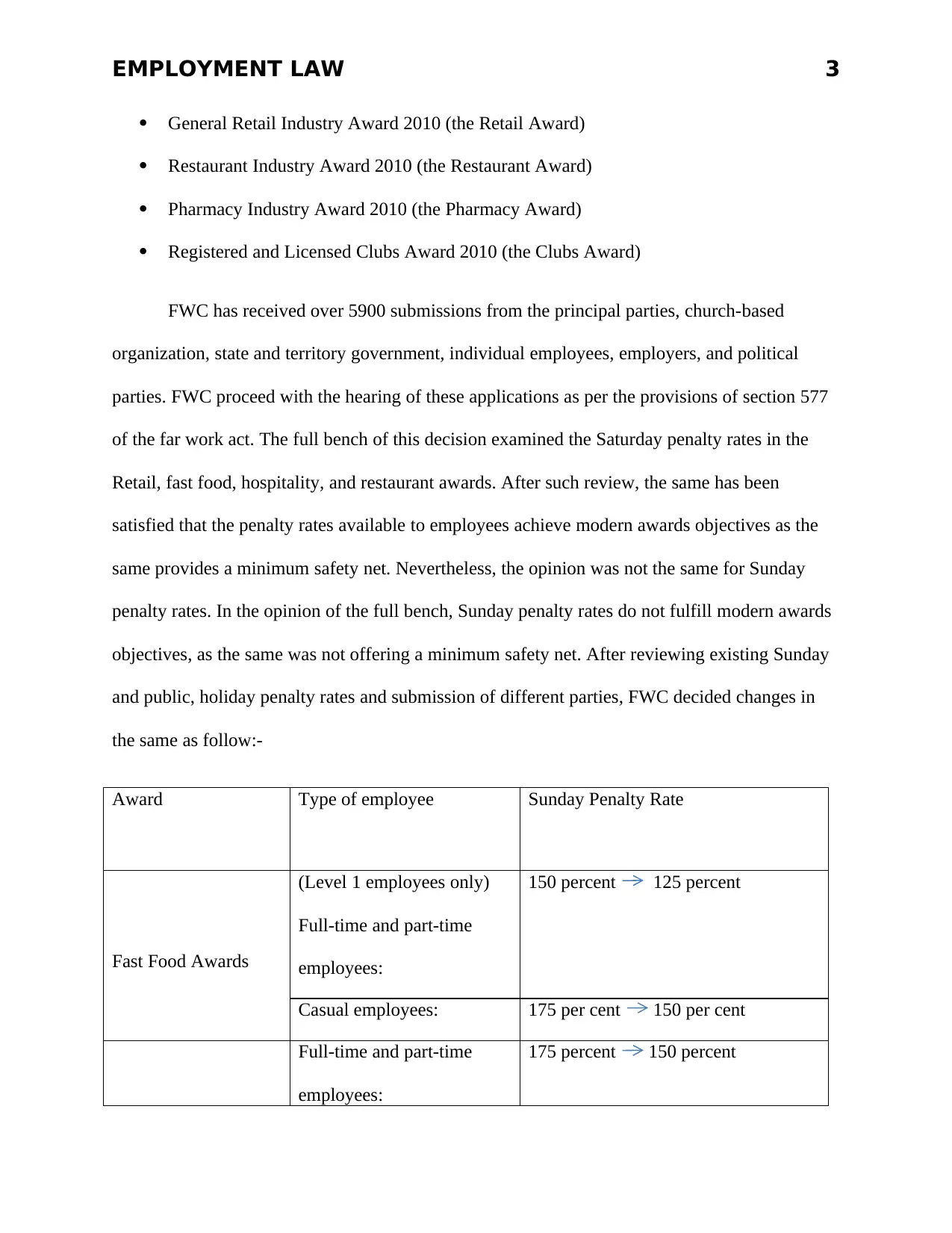
EMPLOYMENT LAW 3
General Retail Industry Award 2010 (the Retail Award)
Restaurant Industry Award 2010 (the Restaurant Award)
Pharmacy Industry Award 2010 (the Pharmacy Award)
Registered and Licensed Clubs Award 2010 (the Clubs Award)
FWC has received over 5900 submissions from the principal parties, church-based
organization, state and territory government, individual employees, employers, and political
parties. FWC proceed with the hearing of these applications as per the provisions of section 577
of the far work act. The full bench of this decision examined the Saturday penalty rates in the
Retail, fast food, hospitality, and restaurant awards. After such review, the same has been
satisfied that the penalty rates available to employees achieve modern awards objectives as the
same provides a minimum safety net. Nevertheless, the opinion was not the same for Sunday
penalty rates. In the opinion of the full bench, Sunday penalty rates do not fulfill modern awards
objectives, as the same was not offering a minimum safety net. After reviewing existing Sunday
and public, holiday penalty rates and submission of different parties, FWC decided changes in
the same as follow:-
Award Type of employee Sunday Penalty Rate
Fast Food Awards
(Level 1 employees only)
Full-time and part-time
employees:
150 percent 125 percent
Casual employees: 175 per cent 150 per cent
Full-time and part-time
employees:
175 percent 150 percent
General Retail Industry Award 2010 (the Retail Award)
Restaurant Industry Award 2010 (the Restaurant Award)
Pharmacy Industry Award 2010 (the Pharmacy Award)
Registered and Licensed Clubs Award 2010 (the Clubs Award)
FWC has received over 5900 submissions from the principal parties, church-based
organization, state and territory government, individual employees, employers, and political
parties. FWC proceed with the hearing of these applications as per the provisions of section 577
of the far work act. The full bench of this decision examined the Saturday penalty rates in the
Retail, fast food, hospitality, and restaurant awards. After such review, the same has been
satisfied that the penalty rates available to employees achieve modern awards objectives as the
same provides a minimum safety net. Nevertheless, the opinion was not the same for Sunday
penalty rates. In the opinion of the full bench, Sunday penalty rates do not fulfill modern awards
objectives, as the same was not offering a minimum safety net. After reviewing existing Sunday
and public, holiday penalty rates and submission of different parties, FWC decided changes in
the same as follow:-
Award Type of employee Sunday Penalty Rate
Fast Food Awards
(Level 1 employees only)
Full-time and part-time
employees:
150 percent 125 percent
Casual employees: 175 per cent 150 per cent
Full-time and part-time
employees:
175 percent 150 percent
Secure Best Marks with AI Grader
Need help grading? Try our AI Grader for instant feedback on your assignments.
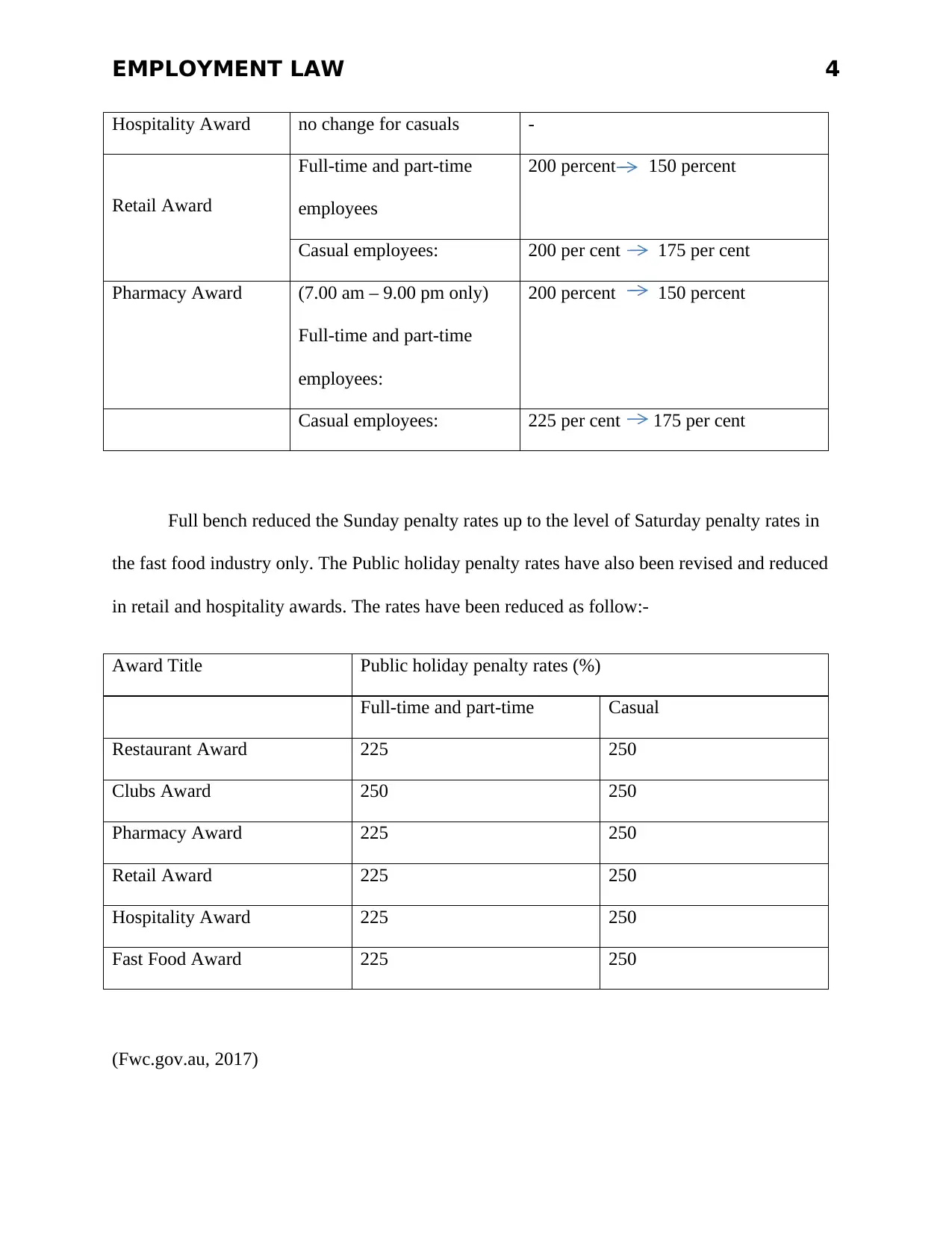
EMPLOYMENT LAW 4
Hospitality Award no change for casuals -
Retail Award
Full-time and part-time
employees
200 percent 150 percent
Casual employees: 200 per cent 175 per cent
Pharmacy Award (7.00 am – 9.00 pm only)
Full-time and part-time
employees:
200 percent 150 percent
Casual employees: 225 per cent 175 per cent
Full bench reduced the Sunday penalty rates up to the level of Saturday penalty rates in
the fast food industry only. The Public holiday penalty rates have also been revised and reduced
in retail and hospitality awards. The rates have been reduced as follow:-
Award Title Public holiday penalty rates (%)
Full-time and part-time Casual
Restaurant Award 225 250
Clubs Award 250 250
Pharmacy Award 225 250
Retail Award 225 250
Hospitality Award 225 250
Fast Food Award 225 250
(Fwc.gov.au, 2017)
Hospitality Award no change for casuals -
Retail Award
Full-time and part-time
employees
200 percent 150 percent
Casual employees: 200 per cent 175 per cent
Pharmacy Award (7.00 am – 9.00 pm only)
Full-time and part-time
employees:
200 percent 150 percent
Casual employees: 225 per cent 175 per cent
Full bench reduced the Sunday penalty rates up to the level of Saturday penalty rates in
the fast food industry only. The Public holiday penalty rates have also been revised and reduced
in retail and hospitality awards. The rates have been reduced as follow:-
Award Title Public holiday penalty rates (%)
Full-time and part-time Casual
Restaurant Award 225 250
Clubs Award 250 250
Pharmacy Award 225 250
Retail Award 225 250
Hospitality Award 225 250
Fast Food Award 225 250
(Fwc.gov.au, 2017)
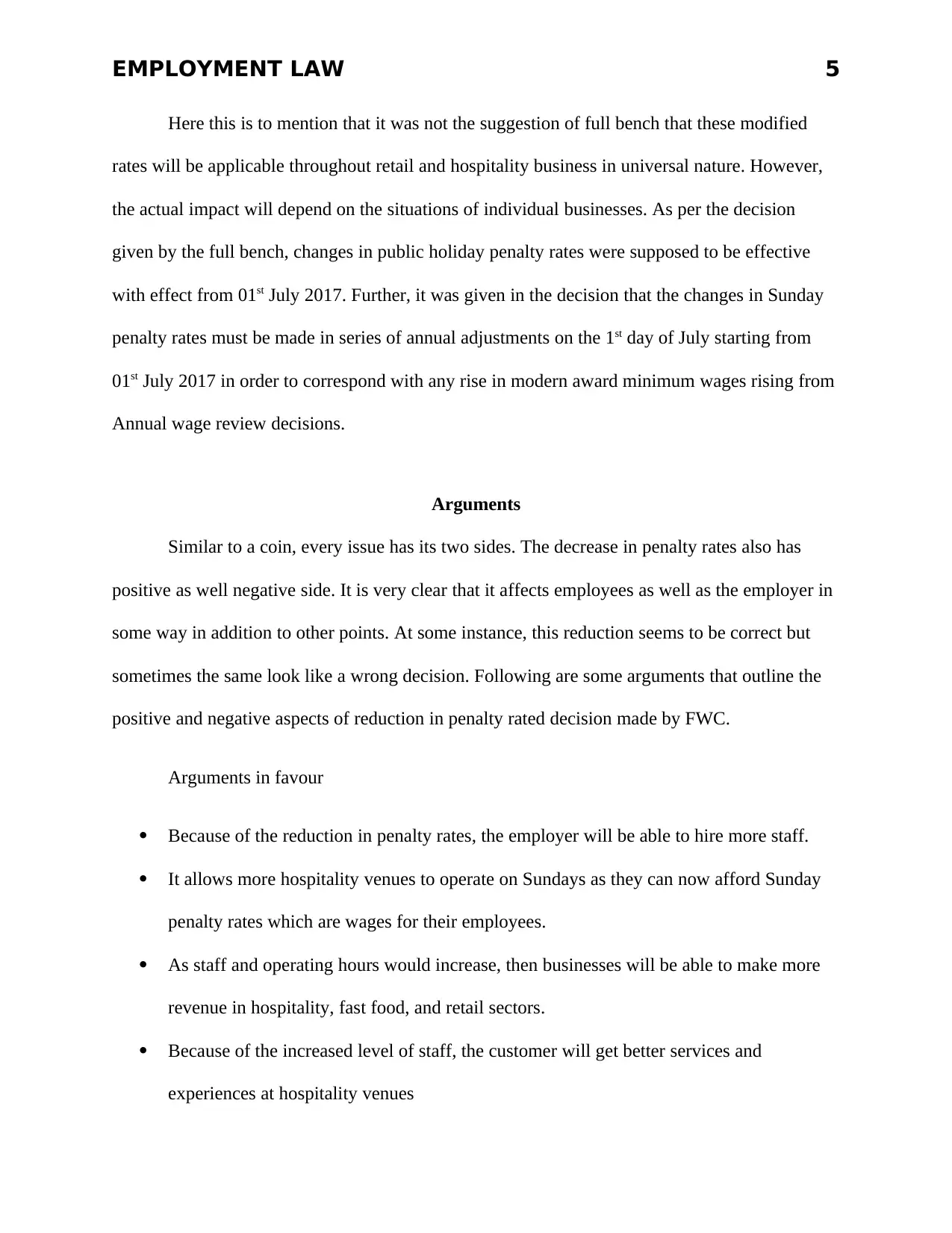
EMPLOYMENT LAW 5
Here this is to mention that it was not the suggestion of full bench that these modified
rates will be applicable throughout retail and hospitality business in universal nature. However,
the actual impact will depend on the situations of individual businesses. As per the decision
given by the full bench, changes in public holiday penalty rates were supposed to be effective
with effect from 01st July 2017. Further, it was given in the decision that the changes in Sunday
penalty rates must be made in series of annual adjustments on the 1st day of July starting from
01st July 2017 in order to correspond with any rise in modern award minimum wages rising from
Annual wage review decisions.
Arguments
Similar to a coin, every issue has its two sides. The decrease in penalty rates also has
positive as well negative side. It is very clear that it affects employees as well as the employer in
some way in addition to other points. At some instance, this reduction seems to be correct but
sometimes the same look like a wrong decision. Following are some arguments that outline the
positive and negative aspects of reduction in penalty rated decision made by FWC.
Arguments in favour
Because of the reduction in penalty rates, the employer will be able to hire more staff.
It allows more hospitality venues to operate on Sundays as they can now afford Sunday
penalty rates which are wages for their employees.
As staff and operating hours would increase, then businesses will be able to make more
revenue in hospitality, fast food, and retail sectors.
Because of the increased level of staff, the customer will get better services and
experiences at hospitality venues
Here this is to mention that it was not the suggestion of full bench that these modified
rates will be applicable throughout retail and hospitality business in universal nature. However,
the actual impact will depend on the situations of individual businesses. As per the decision
given by the full bench, changes in public holiday penalty rates were supposed to be effective
with effect from 01st July 2017. Further, it was given in the decision that the changes in Sunday
penalty rates must be made in series of annual adjustments on the 1st day of July starting from
01st July 2017 in order to correspond with any rise in modern award minimum wages rising from
Annual wage review decisions.
Arguments
Similar to a coin, every issue has its two sides. The decrease in penalty rates also has
positive as well negative side. It is very clear that it affects employees as well as the employer in
some way in addition to other points. At some instance, this reduction seems to be correct but
sometimes the same look like a wrong decision. Following are some arguments that outline the
positive and negative aspects of reduction in penalty rated decision made by FWC.
Arguments in favour
Because of the reduction in penalty rates, the employer will be able to hire more staff.
It allows more hospitality venues to operate on Sundays as they can now afford Sunday
penalty rates which are wages for their employees.
As staff and operating hours would increase, then businesses will be able to make more
revenue in hospitality, fast food, and retail sectors.
Because of the increased level of staff, the customer will get better services and
experiences at hospitality venues
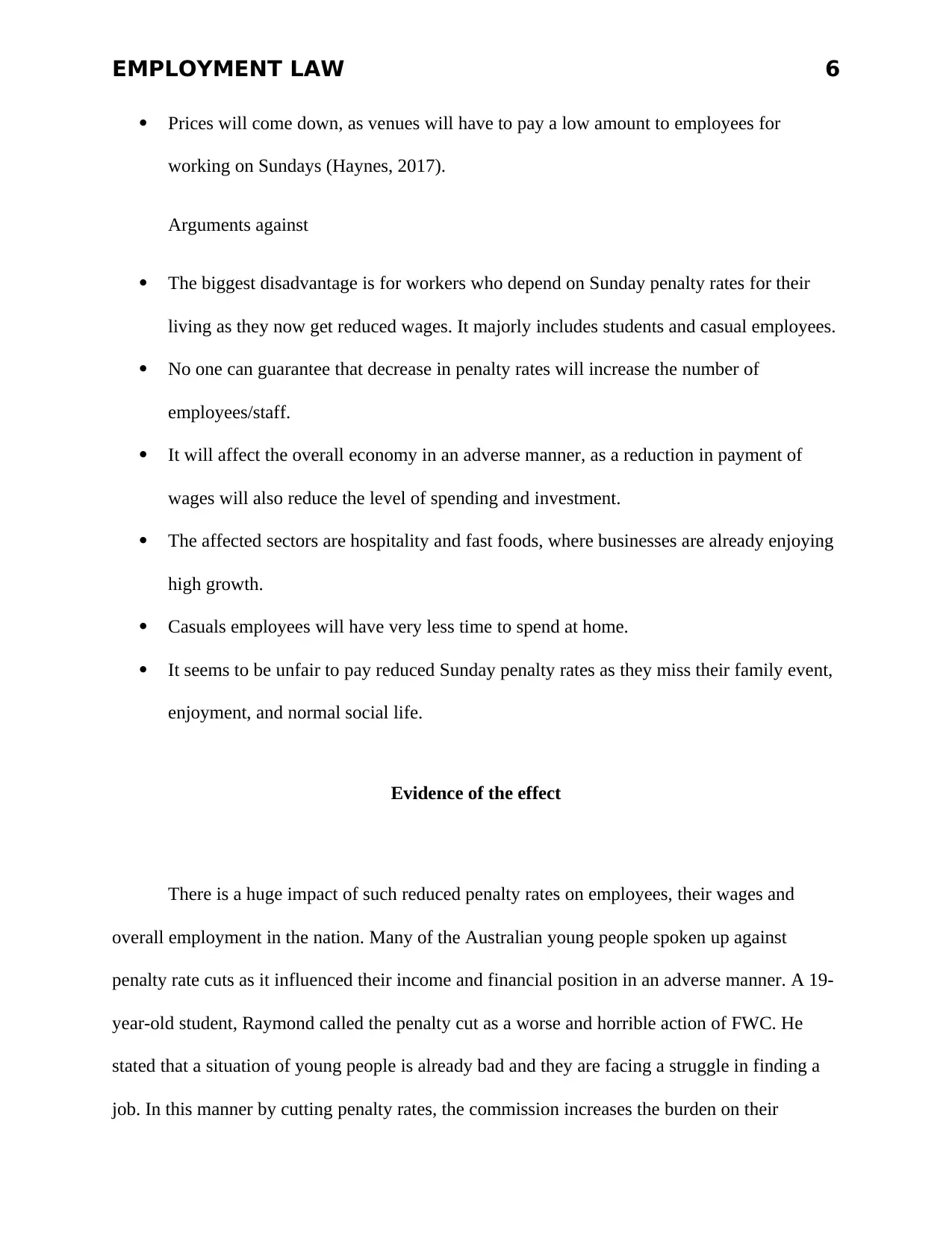
EMPLOYMENT LAW 6
Prices will come down, as venues will have to pay a low amount to employees for
working on Sundays (Haynes, 2017).
Arguments against
The biggest disadvantage is for workers who depend on Sunday penalty rates for their
living as they now get reduced wages. It majorly includes students and casual employees.
No one can guarantee that decrease in penalty rates will increase the number of
employees/staff.
It will affect the overall economy in an adverse manner, as a reduction in payment of
wages will also reduce the level of spending and investment.
The affected sectors are hospitality and fast foods, where businesses are already enjoying
high growth.
Casuals employees will have very less time to spend at home.
It seems to be unfair to pay reduced Sunday penalty rates as they miss their family event,
enjoyment, and normal social life.
Evidence of the effect
There is a huge impact of such reduced penalty rates on employees, their wages and
overall employment in the nation. Many of the Australian young people spoken up against
penalty rate cuts as it influenced their income and financial position in an adverse manner. A 19-
year-old student, Raymond called the penalty cut as a worse and horrible action of FWC. He
stated that a situation of young people is already bad and they are facing a struggle in finding a
job. In this manner by cutting penalty rates, the commission increases the burden on their
Prices will come down, as venues will have to pay a low amount to employees for
working on Sundays (Haynes, 2017).
Arguments against
The biggest disadvantage is for workers who depend on Sunday penalty rates for their
living as they now get reduced wages. It majorly includes students and casual employees.
No one can guarantee that decrease in penalty rates will increase the number of
employees/staff.
It will affect the overall economy in an adverse manner, as a reduction in payment of
wages will also reduce the level of spending and investment.
The affected sectors are hospitality and fast foods, where businesses are already enjoying
high growth.
Casuals employees will have very less time to spend at home.
It seems to be unfair to pay reduced Sunday penalty rates as they miss their family event,
enjoyment, and normal social life.
Evidence of the effect
There is a huge impact of such reduced penalty rates on employees, their wages and
overall employment in the nation. Many of the Australian young people spoken up against
penalty rate cuts as it influenced their income and financial position in an adverse manner. A 19-
year-old student, Raymond called the penalty cut as a worse and horrible action of FWC. He
stated that a situation of young people is already bad and they are facing a struggle in finding a
job. In this manner by cutting penalty rates, the commission increases the burden on their
Paraphrase This Document
Need a fresh take? Get an instant paraphrase of this document with our AI Paraphraser
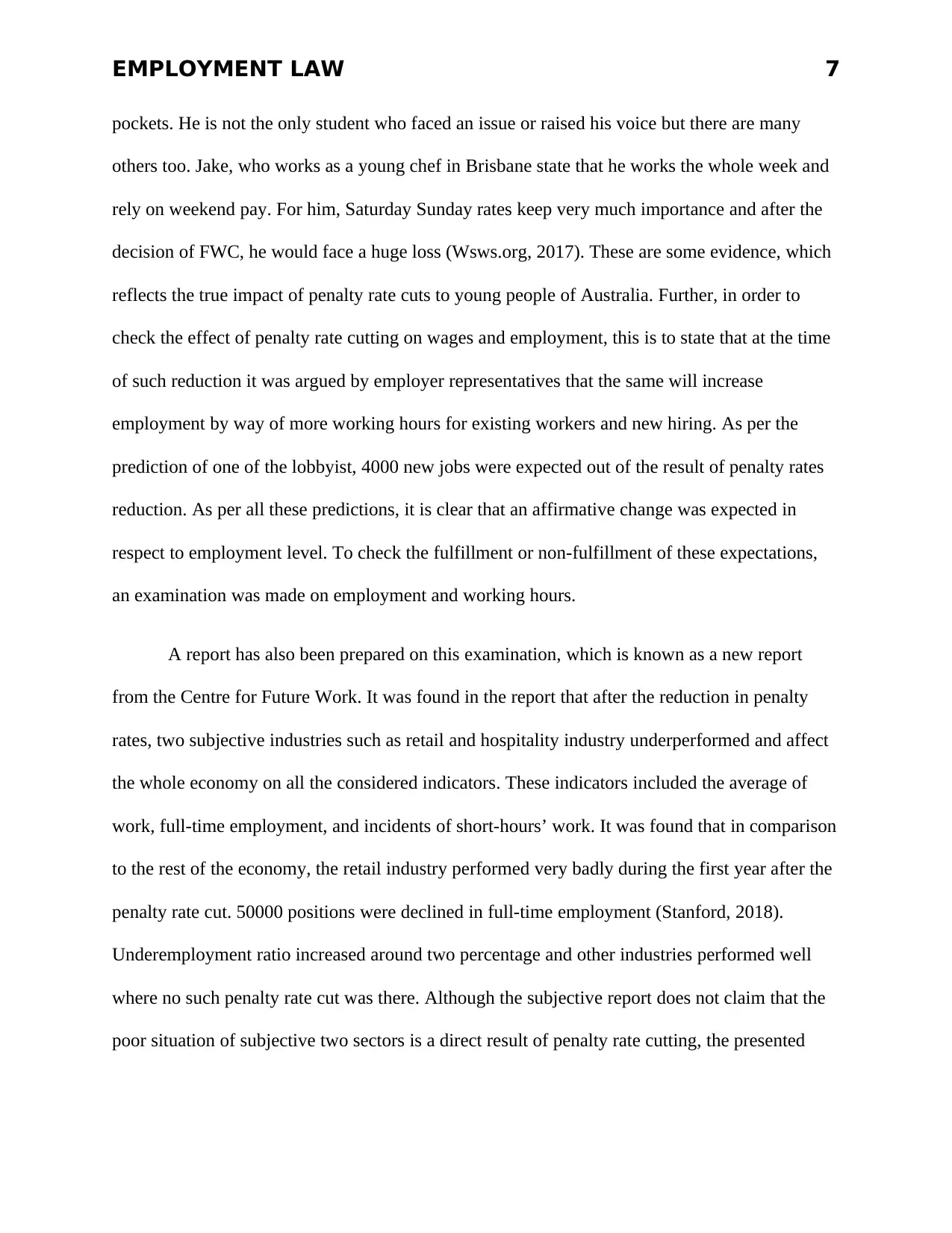
EMPLOYMENT LAW 7
pockets. He is not the only student who faced an issue or raised his voice but there are many
others too. Jake, who works as a young chef in Brisbane state that he works the whole week and
rely on weekend pay. For him, Saturday Sunday rates keep very much importance and after the
decision of FWC, he would face a huge loss (Wsws.org, 2017). These are some evidence, which
reflects the true impact of penalty rate cuts to young people of Australia. Further, in order to
check the effect of penalty rate cutting on wages and employment, this is to state that at the time
of such reduction it was argued by employer representatives that the same will increase
employment by way of more working hours for existing workers and new hiring. As per the
prediction of one of the lobbyist, 4000 new jobs were expected out of the result of penalty rates
reduction. As per all these predictions, it is clear that an affirmative change was expected in
respect to employment level. To check the fulfillment or non-fulfillment of these expectations,
an examination was made on employment and working hours.
A report has also been prepared on this examination, which is known as a new report
from the Centre for Future Work. It was found in the report that after the reduction in penalty
rates, two subjective industries such as retail and hospitality industry underperformed and affect
the whole economy on all the considered indicators. These indicators included the average of
work, full-time employment, and incidents of short-hours’ work. It was found that in comparison
to the rest of the economy, the retail industry performed very badly during the first year after the
penalty rate cut. 50000 positions were declined in full-time employment (Stanford, 2018).
Underemployment ratio increased around two percentage and other industries performed well
where no such penalty rate cut was there. Although the subjective report does not claim that the
poor situation of subjective two sectors is a direct result of penalty rate cutting, the presented
pockets. He is not the only student who faced an issue or raised his voice but there are many
others too. Jake, who works as a young chef in Brisbane state that he works the whole week and
rely on weekend pay. For him, Saturday Sunday rates keep very much importance and after the
decision of FWC, he would face a huge loss (Wsws.org, 2017). These are some evidence, which
reflects the true impact of penalty rate cuts to young people of Australia. Further, in order to
check the effect of penalty rate cutting on wages and employment, this is to state that at the time
of such reduction it was argued by employer representatives that the same will increase
employment by way of more working hours for existing workers and new hiring. As per the
prediction of one of the lobbyist, 4000 new jobs were expected out of the result of penalty rates
reduction. As per all these predictions, it is clear that an affirmative change was expected in
respect to employment level. To check the fulfillment or non-fulfillment of these expectations,
an examination was made on employment and working hours.
A report has also been prepared on this examination, which is known as a new report
from the Centre for Future Work. It was found in the report that after the reduction in penalty
rates, two subjective industries such as retail and hospitality industry underperformed and affect
the whole economy on all the considered indicators. These indicators included the average of
work, full-time employment, and incidents of short-hours’ work. It was found that in comparison
to the rest of the economy, the retail industry performed very badly during the first year after the
penalty rate cut. 50000 positions were declined in full-time employment (Stanford, 2018).
Underemployment ratio increased around two percentage and other industries performed well
where no such penalty rate cut was there. Although the subjective report does not claim that the
poor situation of subjective two sectors is a direct result of penalty rate cutting, the presented
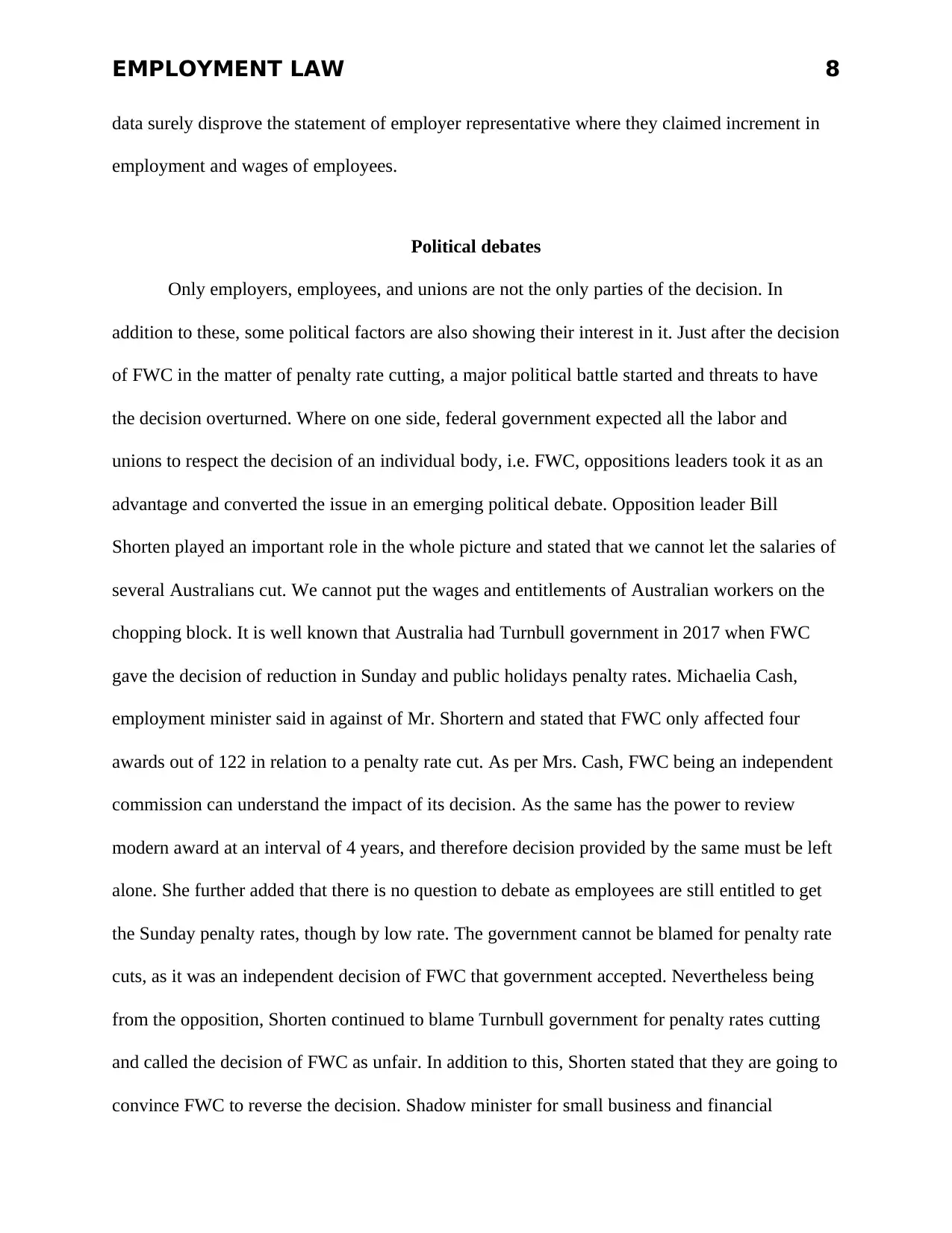
EMPLOYMENT LAW 8
data surely disprove the statement of employer representative where they claimed increment in
employment and wages of employees.
Political debates
Only employers, employees, and unions are not the only parties of the decision. In
addition to these, some political factors are also showing their interest in it. Just after the decision
of FWC in the matter of penalty rate cutting, a major political battle started and threats to have
the decision overturned. Where on one side, federal government expected all the labor and
unions to respect the decision of an individual body, i.e. FWC, oppositions leaders took it as an
advantage and converted the issue in an emerging political debate. Opposition leader Bill
Shorten played an important role in the whole picture and stated that we cannot let the salaries of
several Australians cut. We cannot put the wages and entitlements of Australian workers on the
chopping block. It is well known that Australia had Turnbull government in 2017 when FWC
gave the decision of reduction in Sunday and public holidays penalty rates. Michaelia Cash,
employment minister said in against of Mr. Shortern and stated that FWC only affected four
awards out of 122 in relation to a penalty rate cut. As per Mrs. Cash, FWC being an independent
commission can understand the impact of its decision. As the same has the power to review
modern award at an interval of 4 years, and therefore decision provided by the same must be left
alone. She further added that there is no question to debate as employees are still entitled to get
the Sunday penalty rates, though by low rate. The government cannot be blamed for penalty rate
cuts, as it was an independent decision of FWC that government accepted. Nevertheless being
from the opposition, Shorten continued to blame Turnbull government for penalty rates cutting
and called the decision of FWC as unfair. In addition to this, Shorten stated that they are going to
convince FWC to reverse the decision. Shadow minister for small business and financial
data surely disprove the statement of employer representative where they claimed increment in
employment and wages of employees.
Political debates
Only employers, employees, and unions are not the only parties of the decision. In
addition to these, some political factors are also showing their interest in it. Just after the decision
of FWC in the matter of penalty rate cutting, a major political battle started and threats to have
the decision overturned. Where on one side, federal government expected all the labor and
unions to respect the decision of an individual body, i.e. FWC, oppositions leaders took it as an
advantage and converted the issue in an emerging political debate. Opposition leader Bill
Shorten played an important role in the whole picture and stated that we cannot let the salaries of
several Australians cut. We cannot put the wages and entitlements of Australian workers on the
chopping block. It is well known that Australia had Turnbull government in 2017 when FWC
gave the decision of reduction in Sunday and public holidays penalty rates. Michaelia Cash,
employment minister said in against of Mr. Shortern and stated that FWC only affected four
awards out of 122 in relation to a penalty rate cut. As per Mrs. Cash, FWC being an independent
commission can understand the impact of its decision. As the same has the power to review
modern award at an interval of 4 years, and therefore decision provided by the same must be left
alone. She further added that there is no question to debate as employees are still entitled to get
the Sunday penalty rates, though by low rate. The government cannot be blamed for penalty rate
cuts, as it was an independent decision of FWC that government accepted. Nevertheless being
from the opposition, Shorten continued to blame Turnbull government for penalty rates cutting
and called the decision of FWC as unfair. In addition to this, Shorten stated that they are going to
convince FWC to reverse the decision. Shadow minister for small business and financial
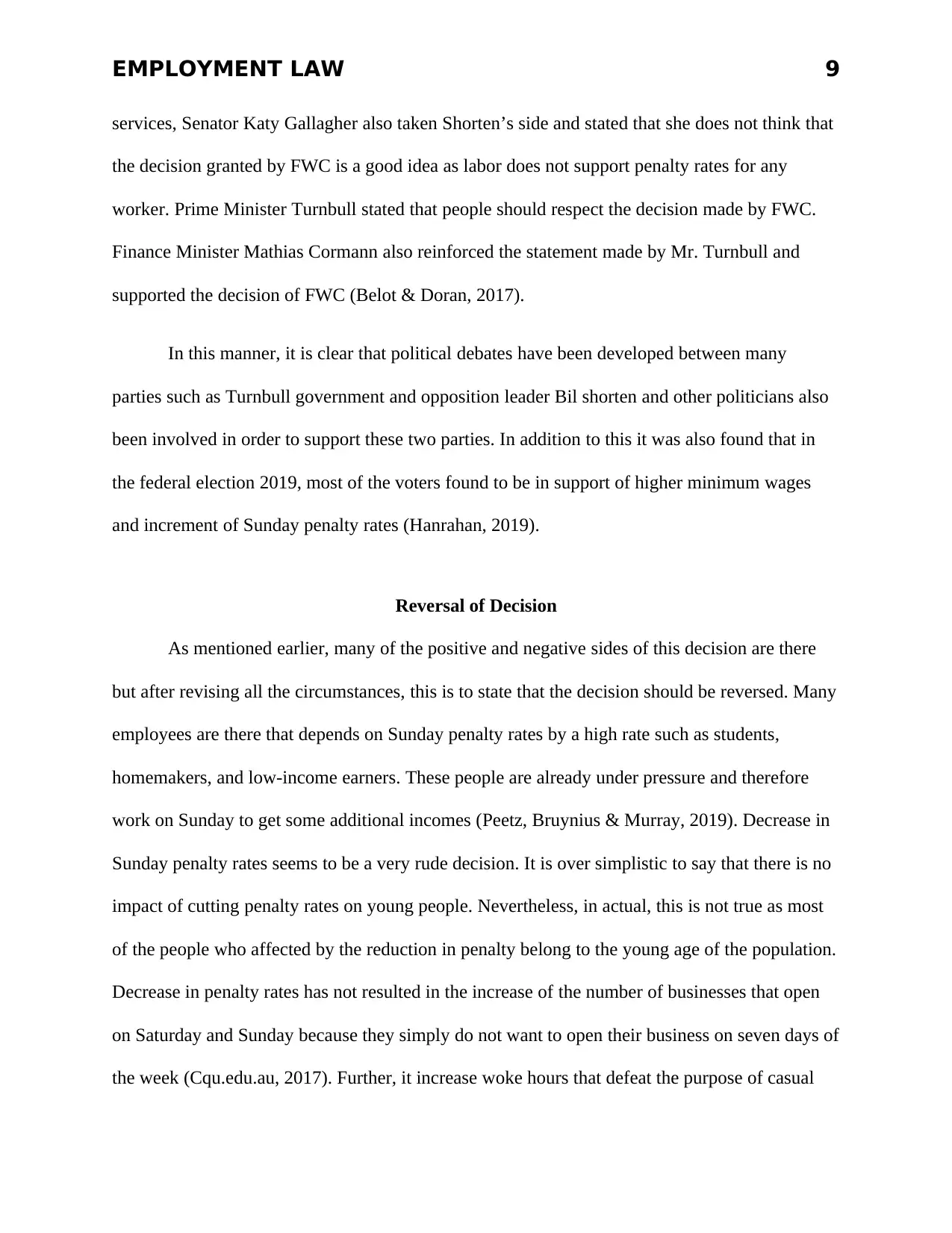
EMPLOYMENT LAW 9
services, Senator Katy Gallagher also taken Shorten’s side and stated that she does not think that
the decision granted by FWC is a good idea as labor does not support penalty rates for any
worker. Prime Minister Turnbull stated that people should respect the decision made by FWC.
Finance Minister Mathias Cormann also reinforced the statement made by Mr. Turnbull and
supported the decision of FWC (Belot & Doran, 2017).
In this manner, it is clear that political debates have been developed between many
parties such as Turnbull government and opposition leader Bil shorten and other politicians also
been involved in order to support these two parties. In addition to this it was also found that in
the federal election 2019, most of the voters found to be in support of higher minimum wages
and increment of Sunday penalty rates (Hanrahan, 2019).
Reversal of Decision
As mentioned earlier, many of the positive and negative sides of this decision are there
but after revising all the circumstances, this is to state that the decision should be reversed. Many
employees are there that depends on Sunday penalty rates by a high rate such as students,
homemakers, and low-income earners. These people are already under pressure and therefore
work on Sunday to get some additional incomes (Peetz, Bruynius & Murray, 2019). Decrease in
Sunday penalty rates seems to be a very rude decision. It is over simplistic to say that there is no
impact of cutting penalty rates on young people. Nevertheless, in actual, this is not true as most
of the people who affected by the reduction in penalty belong to the young age of the population.
Decrease in penalty rates has not resulted in the increase of the number of businesses that open
on Saturday and Sunday because they simply do not want to open their business on seven days of
the week (Cqu.edu.au, 2017). Further, it increase woke hours that defeat the purpose of casual
services, Senator Katy Gallagher also taken Shorten’s side and stated that she does not think that
the decision granted by FWC is a good idea as labor does not support penalty rates for any
worker. Prime Minister Turnbull stated that people should respect the decision made by FWC.
Finance Minister Mathias Cormann also reinforced the statement made by Mr. Turnbull and
supported the decision of FWC (Belot & Doran, 2017).
In this manner, it is clear that political debates have been developed between many
parties such as Turnbull government and opposition leader Bil shorten and other politicians also
been involved in order to support these two parties. In addition to this it was also found that in
the federal election 2019, most of the voters found to be in support of higher minimum wages
and increment of Sunday penalty rates (Hanrahan, 2019).
Reversal of Decision
As mentioned earlier, many of the positive and negative sides of this decision are there
but after revising all the circumstances, this is to state that the decision should be reversed. Many
employees are there that depends on Sunday penalty rates by a high rate such as students,
homemakers, and low-income earners. These people are already under pressure and therefore
work on Sunday to get some additional incomes (Peetz, Bruynius & Murray, 2019). Decrease in
Sunday penalty rates seems to be a very rude decision. It is over simplistic to say that there is no
impact of cutting penalty rates on young people. Nevertheless, in actual, this is not true as most
of the people who affected by the reduction in penalty belong to the young age of the population.
Decrease in penalty rates has not resulted in the increase of the number of businesses that open
on Saturday and Sunday because they simply do not want to open their business on seven days of
the week (Cqu.edu.au, 2017). Further, it increase woke hours that defeat the purpose of casual
Secure Best Marks with AI Grader
Need help grading? Try our AI Grader for instant feedback on your assignments.
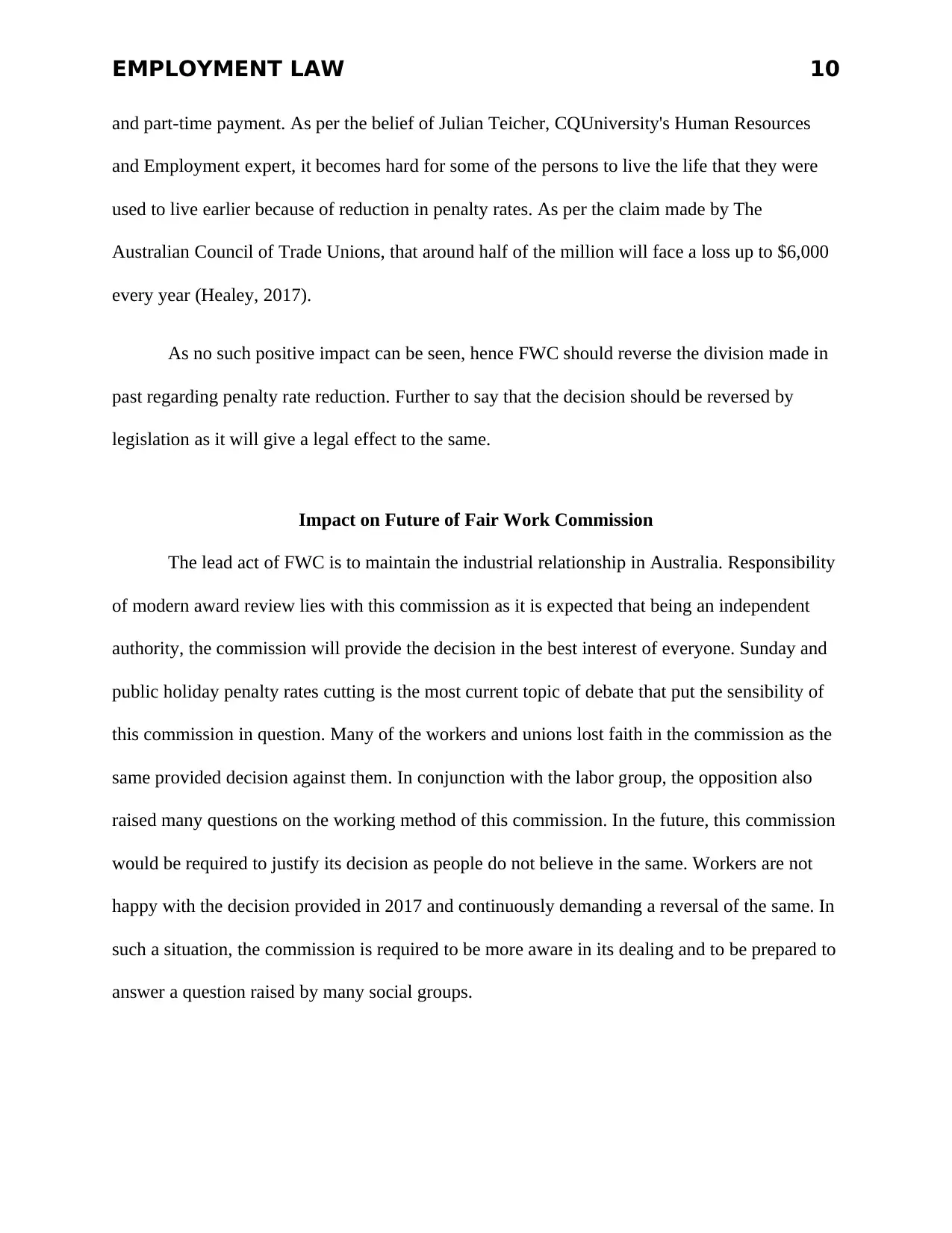
EMPLOYMENT LAW 10
and part-time payment. As per the belief of Julian Teicher, CQUniversity's Human Resources
and Employment expert, it becomes hard for some of the persons to live the life that they were
used to live earlier because of reduction in penalty rates. As per the claim made by The
Australian Council of Trade Unions, that around half of the million will face a loss up to $6,000
every year (Healey, 2017).
As no such positive impact can be seen, hence FWC should reverse the division made in
past regarding penalty rate reduction. Further to say that the decision should be reversed by
legislation as it will give a legal effect to the same.
Impact on Future of Fair Work Commission
The lead act of FWC is to maintain the industrial relationship in Australia. Responsibility
of modern award review lies with this commission as it is expected that being an independent
authority, the commission will provide the decision in the best interest of everyone. Sunday and
public holiday penalty rates cutting is the most current topic of debate that put the sensibility of
this commission in question. Many of the workers and unions lost faith in the commission as the
same provided decision against them. In conjunction with the labor group, the opposition also
raised many questions on the working method of this commission. In the future, this commission
would be required to justify its decision as people do not believe in the same. Workers are not
happy with the decision provided in 2017 and continuously demanding a reversal of the same. In
such a situation, the commission is required to be more aware in its dealing and to be prepared to
answer a question raised by many social groups.
and part-time payment. As per the belief of Julian Teicher, CQUniversity's Human Resources
and Employment expert, it becomes hard for some of the persons to live the life that they were
used to live earlier because of reduction in penalty rates. As per the claim made by The
Australian Council of Trade Unions, that around half of the million will face a loss up to $6,000
every year (Healey, 2017).
As no such positive impact can be seen, hence FWC should reverse the division made in
past regarding penalty rate reduction. Further to say that the decision should be reversed by
legislation as it will give a legal effect to the same.
Impact on Future of Fair Work Commission
The lead act of FWC is to maintain the industrial relationship in Australia. Responsibility
of modern award review lies with this commission as it is expected that being an independent
authority, the commission will provide the decision in the best interest of everyone. Sunday and
public holiday penalty rates cutting is the most current topic of debate that put the sensibility of
this commission in question. Many of the workers and unions lost faith in the commission as the
same provided decision against them. In conjunction with the labor group, the opposition also
raised many questions on the working method of this commission. In the future, this commission
would be required to justify its decision as people do not believe in the same. Workers are not
happy with the decision provided in 2017 and continuously demanding a reversal of the same. In
such a situation, the commission is required to be more aware in its dealing and to be prepared to
answer a question raised by many social groups.
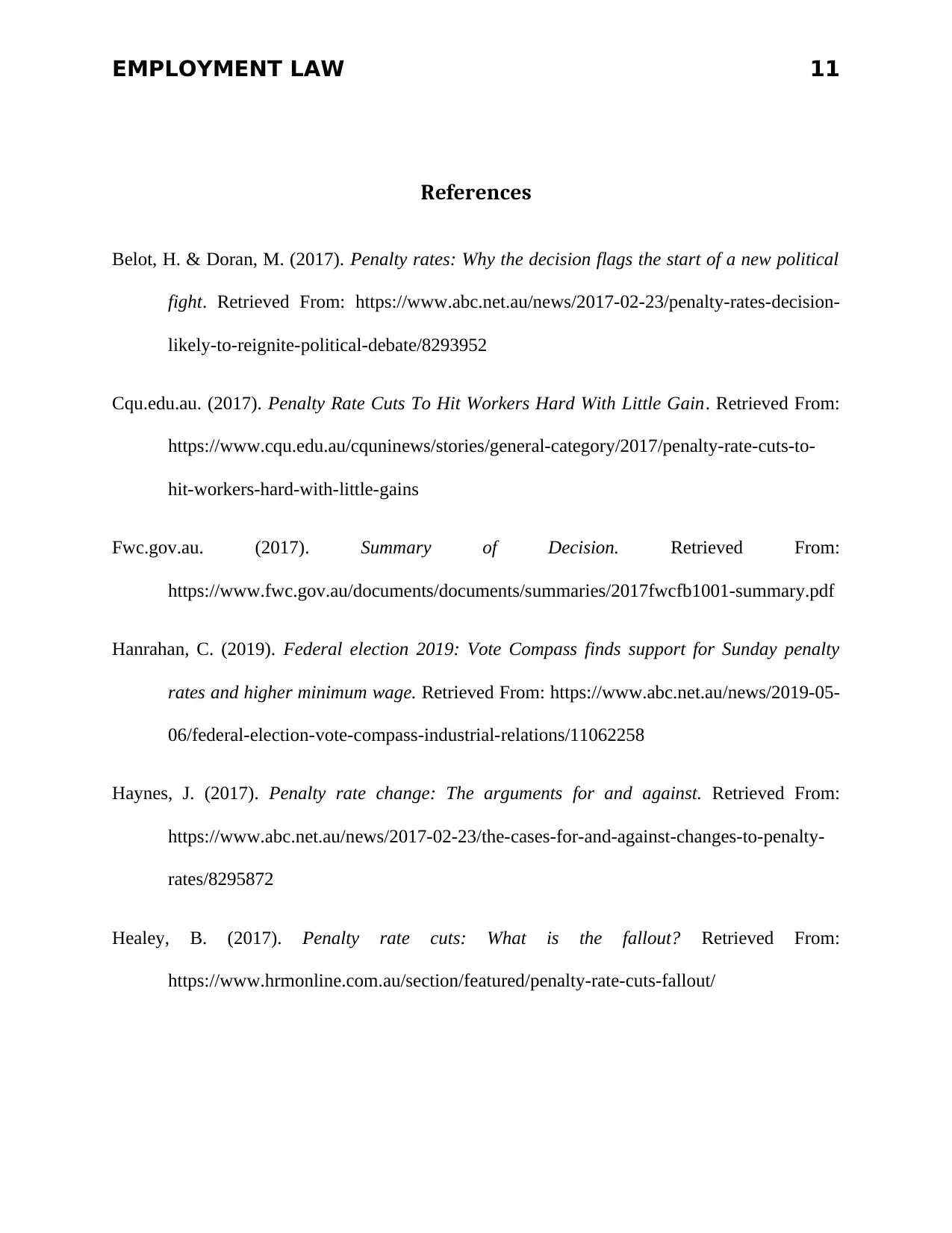
EMPLOYMENT LAW 11
References
Belot, H. & Doran, M. (2017). Penalty rates: Why the decision flags the start of a new political
fight. Retrieved From: https://www.abc.net.au/news/2017-02-23/penalty-rates-decision-
likely-to-reignite-political-debate/8293952
Cqu.edu.au. (2017). Penalty Rate Cuts To Hit Workers Hard With Little Gain. Retrieved From:
https://www.cqu.edu.au/cquninews/stories/general-category/2017/penalty-rate-cuts-to-
hit-workers-hard-with-little-gains
Fwc.gov.au. (2017). Summary of Decision. Retrieved From:
https://www.fwc.gov.au/documents/documents/summaries/2017fwcfb1001-summary.pdf
Hanrahan, C. (2019). Federal election 2019: Vote Compass finds support for Sunday penalty
rates and higher minimum wage. Retrieved From: https://www.abc.net.au/news/2019-05-
06/federal-election-vote-compass-industrial-relations/11062258
Haynes, J. (2017). Penalty rate change: The arguments for and against. Retrieved From:
https://www.abc.net.au/news/2017-02-23/the-cases-for-and-against-changes-to-penalty-
rates/8295872
Healey, B. (2017). Penalty rate cuts: What is the fallout? Retrieved From:
https://www.hrmonline.com.au/section/featured/penalty-rate-cuts-fallout/
References
Belot, H. & Doran, M. (2017). Penalty rates: Why the decision flags the start of a new political
fight. Retrieved From: https://www.abc.net.au/news/2017-02-23/penalty-rates-decision-
likely-to-reignite-political-debate/8293952
Cqu.edu.au. (2017). Penalty Rate Cuts To Hit Workers Hard With Little Gain. Retrieved From:
https://www.cqu.edu.au/cquninews/stories/general-category/2017/penalty-rate-cuts-to-
hit-workers-hard-with-little-gains
Fwc.gov.au. (2017). Summary of Decision. Retrieved From:
https://www.fwc.gov.au/documents/documents/summaries/2017fwcfb1001-summary.pdf
Hanrahan, C. (2019). Federal election 2019: Vote Compass finds support for Sunday penalty
rates and higher minimum wage. Retrieved From: https://www.abc.net.au/news/2019-05-
06/federal-election-vote-compass-industrial-relations/11062258
Haynes, J. (2017). Penalty rate change: The arguments for and against. Retrieved From:
https://www.abc.net.au/news/2017-02-23/the-cases-for-and-against-changes-to-penalty-
rates/8295872
Healey, B. (2017). Penalty rate cuts: What is the fallout? Retrieved From:
https://www.hrmonline.com.au/section/featured/penalty-rate-cuts-fallout/
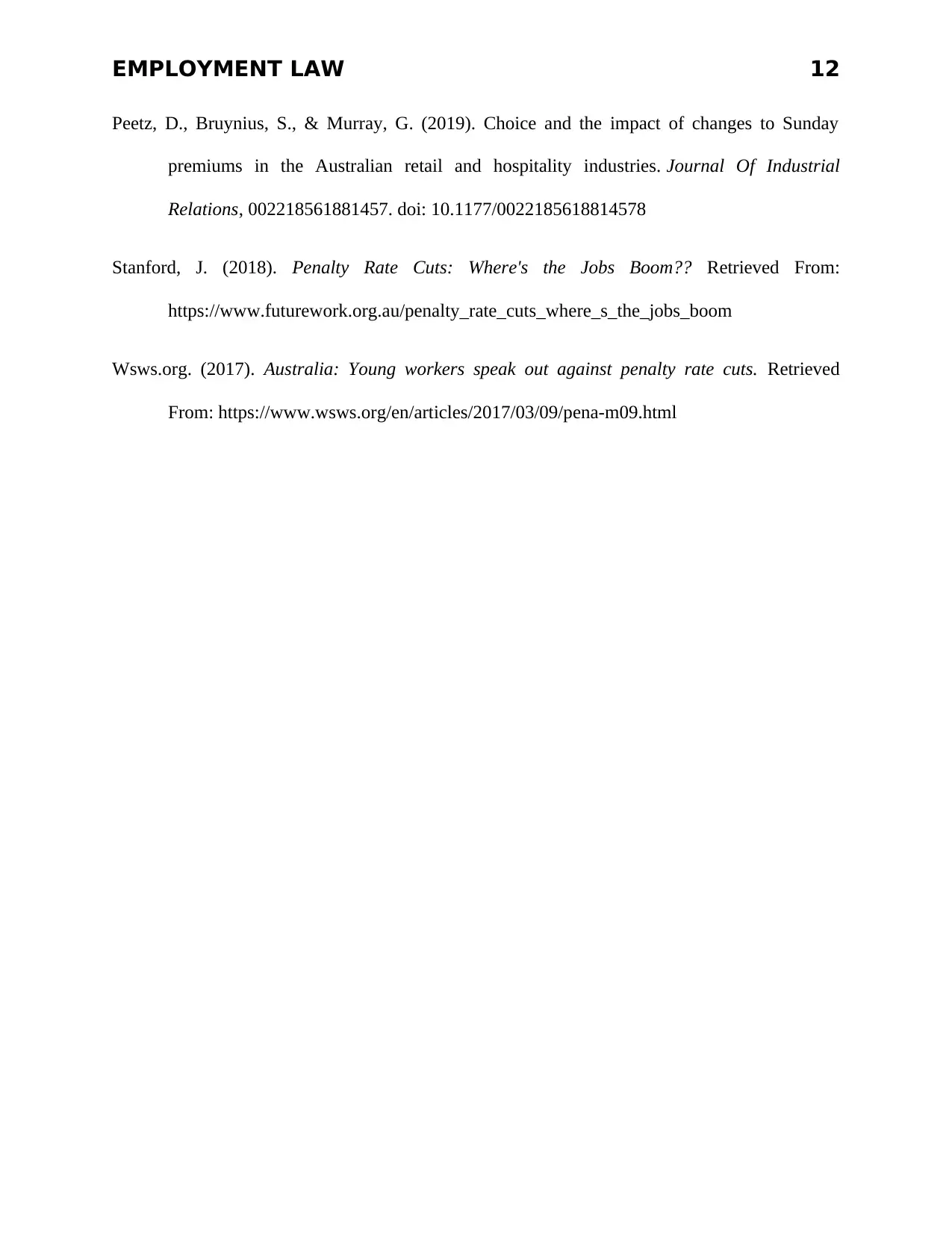
EMPLOYMENT LAW 12
Peetz, D., Bruynius, S., & Murray, G. (2019). Choice and the impact of changes to Sunday
premiums in the Australian retail and hospitality industries. Journal Of Industrial
Relations, 002218561881457. doi: 10.1177/0022185618814578
Stanford, J. (2018). Penalty Rate Cuts: Where's the Jobs Boom?? Retrieved From:
https://www.futurework.org.au/penalty_rate_cuts_where_s_the_jobs_boom
Wsws.org. (2017). Australia: Young workers speak out against penalty rate cuts. Retrieved
From: https://www.wsws.org/en/articles/2017/03/09/pena-m09.html
Peetz, D., Bruynius, S., & Murray, G. (2019). Choice and the impact of changes to Sunday
premiums in the Australian retail and hospitality industries. Journal Of Industrial
Relations, 002218561881457. doi: 10.1177/0022185618814578
Stanford, J. (2018). Penalty Rate Cuts: Where's the Jobs Boom?? Retrieved From:
https://www.futurework.org.au/penalty_rate_cuts_where_s_the_jobs_boom
Wsws.org. (2017). Australia: Young workers speak out against penalty rate cuts. Retrieved
From: https://www.wsws.org/en/articles/2017/03/09/pena-m09.html
1 out of 13
Related Documents
Your All-in-One AI-Powered Toolkit for Academic Success.
+13062052269
info@desklib.com
Available 24*7 on WhatsApp / Email
![[object Object]](/_next/static/media/star-bottom.7253800d.svg)
Unlock your academic potential
© 2024 | Zucol Services PVT LTD | All rights reserved.





